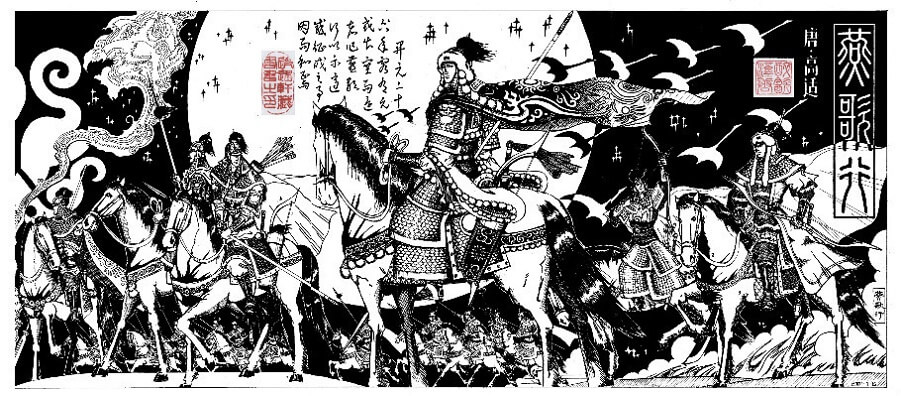A Song of the Yan Country
- Poetry of Gao Shi

In the sixth year of Kaiyuan, a friend returned from the border and showed me the Yan Song. Moved by what he told me of the expedition, I have written this poem to the same rhymes.
The northeastern border of China was dark with smoke and dust.
To repel the savage invaders, our generals, leaving their families,
Strode forth together, looking as heroes should look;
And having received from the Emperor his most gracious favour,
They marched to the beat of gong and drum through the Elm Pass.
They circled the Stone Tablet with a line of waving flags,
Till their captains over the Sea of Sand were twanging feathered orders.
The Tartar chieftain's hunting-fires glimmered along Wolf Mountain,
And heights and rivers were cold and bleak there at the outer border;
But soon the barbarians' horses were plunging through wind and rain.
Half of our men at the front were killed, but the other half are living,
And still at the camp beautiful girls dance for them and sing.
...As autumn ends in the grey sand, with the grasses all withered,
The few surviving watchers by the lonely wall at sunset,
Serving in a good cause, hold life and the foeman lightly.
And yet, for all that they have done, Elm Pass is still unsafe.
Still at the front, iron armour is worn and battered thin,
And here at home food-sticks are made of jade tears.
Still in this southern city young wives' hearts are breaking,
While soldiers at the northern border vainly look toward home.
The fury of the wind cuts our men's advance
In a place of death and blue void, with nothingness ahead.
Three times a day a cloud of slaughter rises over the camp;
And all night long the hour-drums shake their chilly booming,
Until white swords can be seen again, spattered with red blood.
...When death becomes a duty, who stops to think of fame?
Yet in speaking of the rigours of warfare on the desert
We name to this day Li, the great General, who lived long ago.
Folk-song-styled-verse
This poem was composed in the 26th year of the Kaiyuan era of Emperor Xuanzong of Tang (738 AD), during a period of military defense against northern ethnic minorities. At that time, border conflicts were frequent, soldiers endured long and harsh garrison duties, and the battles were brutal. Moved by the bravery and suffering of the soldiers, the poet wrote this poem, which not only portrays the loyalty and fearlessness of the frontier troops but also exposes the cruel reality of the commanders' indulgence and neglect of their soldiers.
开元二十六年,客有从元戎出塞而还者,作《燕歌行》以示,适感征戍之事,因而和焉。
汉家烟尘在东北,汉将辞家破残贼。
男儿本自重横行,天子非常赐颜色。
摐金伐鼓下榆关,旌旆逶迤碣石间。
校尉羽书飞瀚海,单于猎火照狼山。
山川萧条极边土,胡骑凭陵杂风雨。
战士军前半死生,美人帐下犹歌舞。
大漠穷秋塞草腓,孤城落日斗兵稀。
身当恩遇常轻敌,力尽关山未解围。
铁衣远戍辛勤久,玉箸应啼别离后。
少妇城南欲断肠,征人蓟北空回首。
边庭飘飖那可度,绝域苍茫无所有。
杀气三时作阵云,寒声一夜传刁斗。
相看白刃血纷纷,死节从来岂顾勋!
君不见沙场征战苦,至今犹忆李将军。
- Why Chinese poems is so special?
- The most distinctive features of Chinese poetry are: concision- many poems are only four lines, and few are much longer than eight; ambiguity- number, tense and parts of speech are often undetermined, creating particularly rich interpretative possibilities; and structure- most poems follow quite strict formal patterns which have beauty in themselves as well as highlighting meaningful contrasts.
- How to read a Chinese poem?
- Like an English poem, but more so. Everything is there for a reason, so try to find that reason. Think about all the possible connotations, and be aware of the different possibilities of number and tense. Look for contrasts: within lines, between the lines of each couplet and between successive couplets. Above all, don't worry about what the poet meant- find your meaning.
- An Early Audience at the Palace of Light, Harmonizing Secretary Jia Zhi's Poem
- Farewell to a Japanese Monk
- Watching the Hunt
- The Lake Qi
- The Pepper Garden
- Mengcheng Mound
- A Boat in Spring on Jo-Ya Lake
- Night at Longxing Temple
- The Abbot’s Hut
- Passing by Monk Rong’s Hermitage